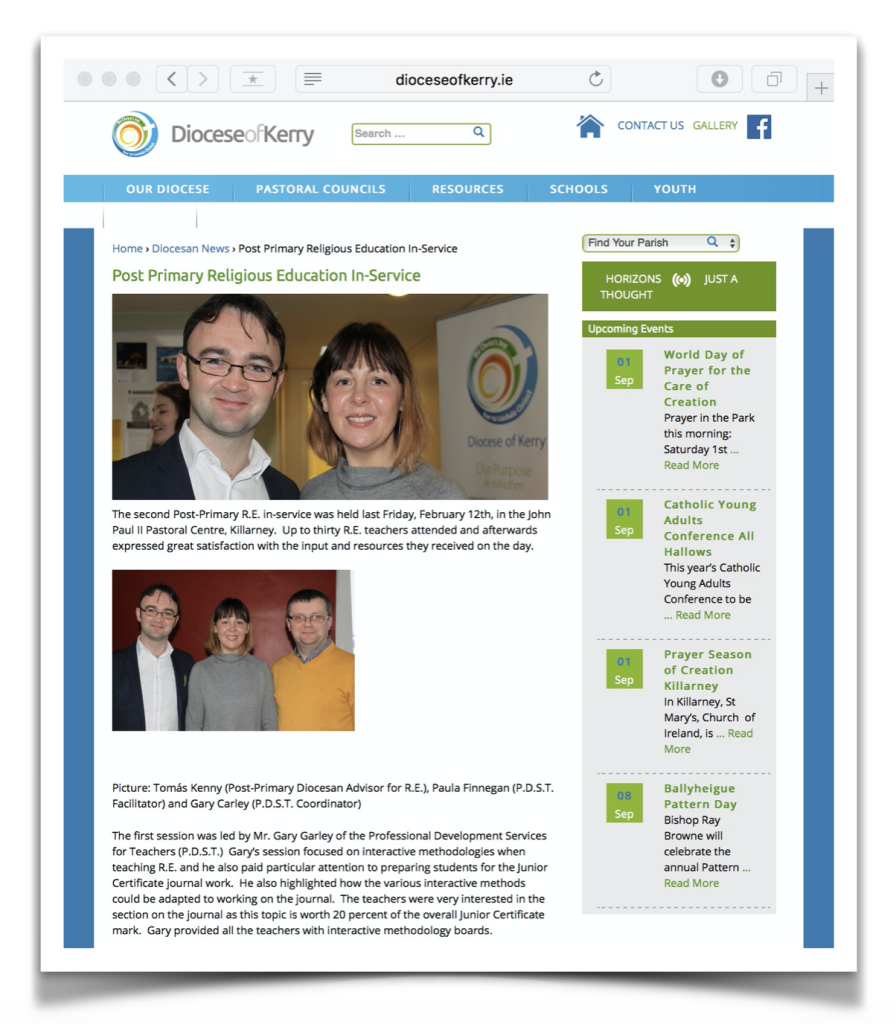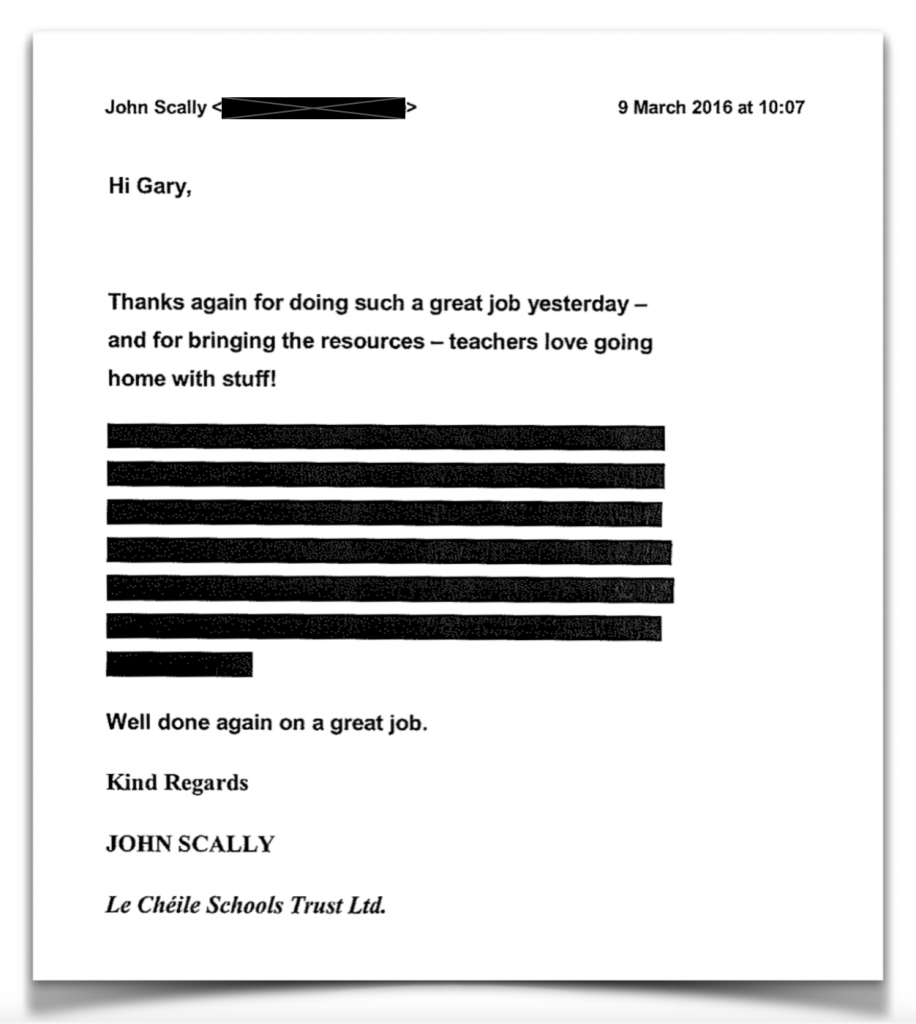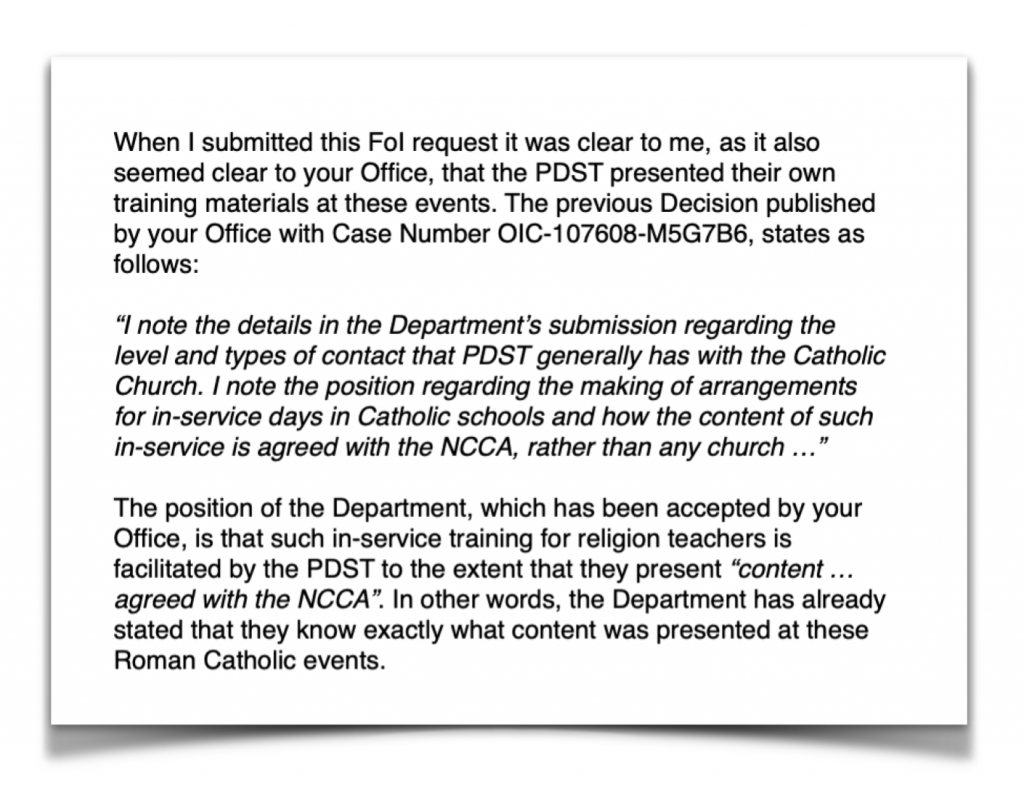Even after a teacher is fully qualified to work at secondary schools, they will need to undergo Continuous Professional Development (CPD). In Ireland, the Professional Development Service for Teachers (PDST) is a function within the Department of Education (DoE) that provides this kind of CPD through “in-service training days”. Teachers attend a formal training course as part of their contracted hours, while cover is provided for their normal classes.
The PDST in-service training days include courses for religion teachers. Whereas the DoE has insisted that any such public funding for religion courses relates only to the State curriculum designed for those of all faiths and none, in reality the PDST arranges joint in-service training days with the Roman Catholic Church.

On 1st January 2018, I submitted a Freedom of Information request seeking correspondence between the PDST and the Roman Catholic Church in relation to these joint in-service training days, along with details of the training materials presented to teachers by the PDST. Over almost five years since then, the PDST has provided a long list of mutually contradictory excuses for why they won’t provide these records. The full details of all the associated appeal documents at the Office of the Information Commissioner (OIC) describe a sequence of PDST positions that may be summarised as follows:
- At first, the PDST denied that they arranged any joint in-service days with the Roman Catholic Church, or corresponded in any way with any representatives of the Roman Catholic Church.
- Subsequently, the PDST admitted that there were two joint in-service training days with the Roman Catholic Church during the relevant calendar year. This was after they were informed that the Diocese of Kerry and the Archdiocese of Dublin had published photographs of those events on their web sites.
- Next, the PDST admitted that they had arranged eight joint in-service training days with the Roman Catholic Church during the relevant calendar year. In fact, they had recorded the number of attendees at each event within an internal report. When I complained to the OIC about the initial false responses to my FoI request, I was admonished that imperfect memories may cause incorrect information to be provided in good faith.
- I sought correspondence and training materials relating to the eight in-service days, which should have been provided in response to my original January 2018 request. I was told that only two emails existed because these events were arranged by telephone. The forgetful PDST that were initially unable to recall that these events had even taken place at all, were now able to recollect how the date, time, agenda and location for each event around the country, had all been agreed verbally without creating any records.
- Subsequently, it became clear from a separate unrelated FoI request that there were in fact dozens of emails between the PDST and the Roman Catholic Church arranging these events. As I pointed out to the OIC during their “investigation”, it was simply not credible to claim that the time, date, location and agenda for the eight training courses were all agreed by telephone, such that no records were created.
Notwithstanding how obviously absurd the claims of the PDST were, at every turn the OIC has accepted their position at face value. The verbatim story related by the PDST has been reproduced as the position of the OIC and published as their “formal legally binding decision”. This has been the case even when each subsequent decision contradicts the previous one. Such a situation creates an obvious problem for the OIC, since they have now published almost five years of mutually contradictory decisions on this topic. That is, when they inevitably come to issue another “formal legally binding decision” on the same topic, how can it have any credibility when every other decision has already been contradicted by a subsequent one? When an organisation like the OIC becomes sanguine about publishing false conclusions and unconcerned about fixing previous mistakes, the primary effect of this is to diminish the credibility of their future publications.
Consider the two most recent decisions that have been published by the OIC on this topic. On 31st January 2022, a “Senior Investigator” at the OIC published their decision on my request for the correspondence arranging the eight PDST in-service training days with the Roman Catholic Church. That decision is still available on the OIC web site and is also reproduced at the bottom of this page. The decision records that my FoI request included the following text:
- “All correspondence between the PDST and representatives of the Catholic Church during calendar year 2016.”
- “This is to include agreements and discussions relating to the content to be presented at in-service training days.”
The OIC decision then goes on to quote the position of the DoE, as submitted during their “investigation” of my appeal. This OIC description of the DoE position includes the following text:
“The Department says that … the same content (as agreed between the PDST and the NCCA) is delivered at RE in-service days, regardless of the religious ethos of the school. It says that only a small number of records relevant to part 1 were found because most events are arranged by telephone.”
Quote from OIC decision
So as the DoE tells it, the PDST in-service training for religion teachers uses content that has been agreed in advance with the National Council for Curriculum and Assessment (NCCA). That is, whether the training is delivered during a joint event with the Roman Catholic Church, or in a school with any other ethos, the content is suitable for those of all faiths and none consistent with the State curriculum defined by the NCCA. Moreover, the DoE stated that only two emails were exchanged when arranging the eight training course as “most events are arranged by telephone”. When publishing their their “formal legally binding decision” on this matter, the OIC accepted the position of the DoE entirely:
“I note the details in the Department’s submission regarding the level and types of contact that PDST generally has with the Catholic Church. I note the position regarding the making of arrangements for in-service days in Catholic schools and how the content of such in-service is agreed with the NCCA, rather than any church, and delivered in all schools … All of these matters are, in my view, relevant to the nature and number of records that one might expect to exist in relation to the applicant’s request in the first instance, and to the reasonableness of the steps taken to find them.”
Quote from OIC Decision
The OIC decided that there was no need to conduct a more thorough search for emails arranging the joint in-service training with the Roman Catholic Church, as those events were all “arranged by telephone”. The OIC also noted that before a PDST representative delivers the training, “the content of such in-service is agreed with the NCCA“. Since these details are still published on the OIC web site, they can be easily compared with the next decision of the OIC on the same topic. The subsequent decision of the OIC came after I demonstrated that it was just plain flat wrong to state that “most events are arranged by telephone”. In fact, all of the eight relevant events during 2016 were arranged by email and I was able to provide copies of those emails. For example, the Le Chéile Schools Trust comprises fifteen Roman Catholic religious orders, and their Faith Development Coordinator arranged one of the events by sending the email illustrated below:

While it is certainly true that forgetfulness might explain a good faith omission, there is no good faith explanation for how the DoE manufactured a false story about all events being “arranged by telephone”, when that never happened. It is clear from the email illustrated above that John Scally from the Le Chéile Schools Trust expected that Gary Carley from the PDST would make a presentation during the in-service training day. This would be the presentation that the DoE had claimed the PDST would have “agreed with the NCCA”, and the Diocese of Kerry web page illustrated above describes “Gary’s session” delivering this content. From the follow-up email illustrated below, it seems that John Scally was not disappointed with how the in-service training was delivered by Gary Carley.

Since the previous OIC decision concluding that these events were arranged by telephone was now demonstrable nonsense, I again sought records relating to the presentation materials delivered by the PDST at their joint in-service training with the Roman Catholic Church. I had imagined that the OIC would be concerned that they had published a decision with overtly false conclusions, by repeating a story about telephone arrangements that had been invented out of whole cloth by the DoE. I was wrong.
On 30th November 2023, a “Senior Investigator” at the OIC published another decision on this same FoI request. The new OIC decision is also available on their web site and is also reproduced at the bottom of this page. I had picked one of the eight relevant in-service days and sought the training materials that were delivered by the PDST during that specific event. After describing the positions of each party, the following conclusions are recorded in the “Findings” section of the new OIC decision:
“The meeting in question involved a group of religion teachers from schools within the Le Chéile Schools Trust, with an advisor from PDST invited to attend and provide an input which he apparently did. It is the Department’s position that it could find no further records relating to this event … The Investigator referred the Department to a comment in one of the email records that was released which thanked the PDST advisor and said that “teachers love going home with stuff”, and asked it to explain what this referred to. The Department said that the “stuff” in this instance was likely to have been generic PDST items like graphic organisers …”
Quote from OIC Decision
While the reference to “stuff” may indeed have been to “graphic organisers”, this is not at all relevant to the presentation that was given to the teachers after that content had been agreed with the NCCA. There is no question that such a presentation was given by the PDST, irrespective of what the “stuff” referred to was. It was this PDST presentation that my FoI request had sought to access, and the OIC had already concluded that “the content is agreed with the NCCA“.
The DoE asked Gary Carley for the presentation, but he no longer works for the PDST and doesn’t have a copy. On this basis, the OIC agreed with the DoE that there was no point conducting any further searches for the presentation materials. The OIC had previously concluded that all such presentations given by the PDST were agreed in advance with the NCCA, but apparently they are now also comfortable that this NCCA approval process has been completed without creating any records. Perhaps the NCCA approval process was also “arranged by telephone”, whereby the PDST read their presentation aloud and the NCCA provided verbal approval? That would be no more absurd than the other DoE fabrications repeated as the conclusion of a “formal legally binding decision” by the OIC.
The OIC decision justified their latest decision as follows:
“It is important to note that no evidence has been made available to this Office to suggest that the [PDST] does, indeed, hold relevant records at this stage.”
Quote from OIC Decision
That statement is roughly as accurate as the previous OIC decision that concluded all PDST joint in-service training days with the Roman Catholic Church were “arranged by telephone”. During their “investigation”, I was asked by the OIC for evidence that the PDST might have records relating to the presentations they delivered at these events. The following is an extract from my email reply to the OIC:

When the OIC asked for evidence that the PDST might have records of this training content, the evidence supplied was the previous OIC decision that concluded the PDST knew exactly what content was presented at these events. Unfortunately though, OIC decisions are now so obviously discredited that they aren’t even considered to be credible evidence by the OIC.